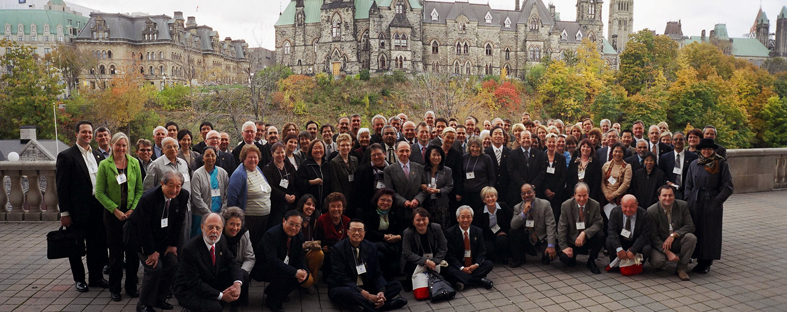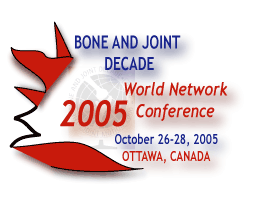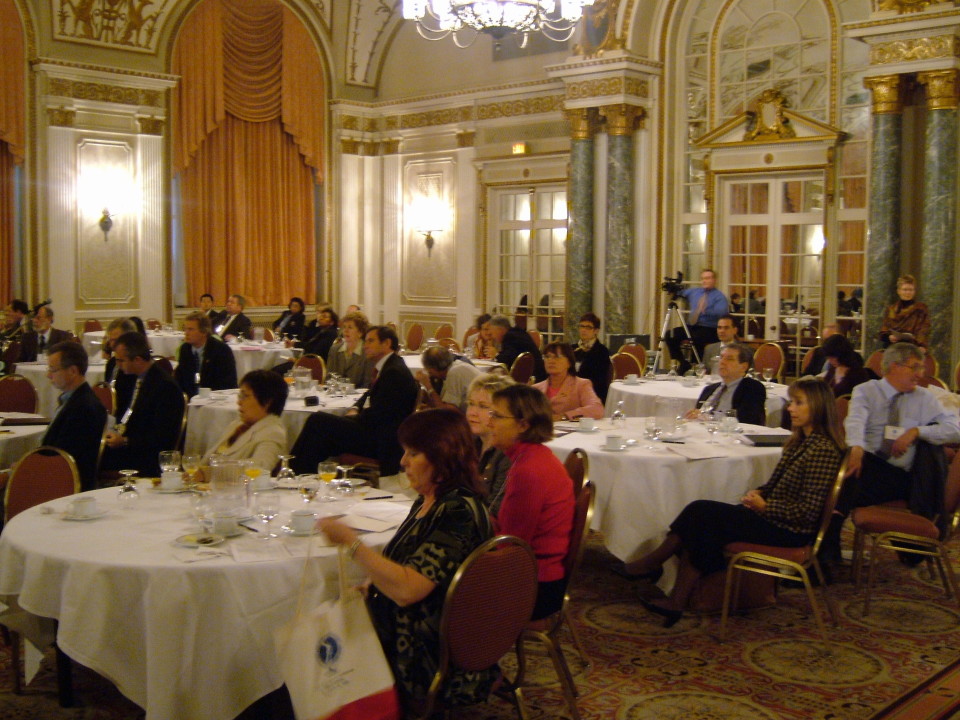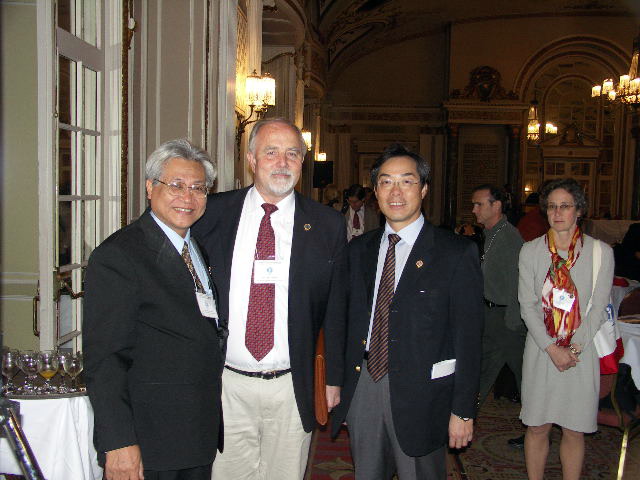The Bone and Joint Decade
2005 Patient Advocacy & World Network Conference
Ottawa, Canada
26-28 October 2005

By all accounts, the 2005 Bone and Joint Decade World Network Conference, held in Canada’s capital city Ottawa from 26-28 October,was a resounding success. This unique event brought together musculoskeletal specialists -- both from the patient advocacy and the professional spheres – from 45 countries around the world to begin the process of formulating Global Minimum Standards of Care for Musculoskeletal Health. On behalf of the BJD International Steering Committee (ISC) and the Canadian Network, we wish to thank participants for their engaging and lively contributions to the panel discussions and brainstorming sessions. Over the span of four days, we heard many perspectives on hot issues such as identifying risk factors for hip fractures and prevention strategies, coping with chronic pain and road trauma reduction. There was no shortage of interaction as various outlooks from different parts of the world were presented and discussed.
 Prof Lars Lidgren, Chairman of the ISC said: “We are now halfway into the Decade and musculoskeletal science is appearing on national research agendas and in several healthcare initiatives, resulting in more resources being channeled into this important field. Collaboration between professional and patient organisations is imperative to advance the agenda.”
Prof Lars Lidgren, Chairman of the ISC said: “We are now halfway into the Decade and musculoskeletal science is appearing on national research agendas and in several healthcare initiatives, resulting in more resources being channeled into this important field. Collaboration between professional and patient organisations is imperative to advance the agenda.”
Indeed there is a strong policy movement going on in healthcare, particularly in the arena of access to care and minimum standards, and the BJD Conference programme aimed to address this challenge. “The activities over these ten days will change the landscape for people with musculoskeletal disease,” said Denis Morrice, BJD Ambassador from Canada.

The programme for the ten days under the banner of “Rock This Joint 2005”, included:
· BJD Patient Advocacy Meeting: Putting People First, October 25-26
· BJD World Network Conference, October 26-28
· Canadian Arthritis Network Annual Meeting, October 29-31
· Alliance for Canadian Arthritis Programme, November 1-3
The highlights of this unique gathering are numerous, but a few examples include discussions led by representatives of the World Health Organization, the Centre for Chronic Disease Prevention and Control Public Health Agency of Canada, the Canadian Institutes of Health Research, the US National Institute of Arthritis and Musculoskeletal and Skin Diseases, the Canadian Arthritis Patient Alliance and Consumer, Cochrane Musculoskeletal Group. These and other presentations can be viewed online via the links above.

Directly preceding the BJD World Network Conference, for the first time ever a BJD International Patient Advocacy Meeting was held under the banner “Putting People First”. The idea for this unique gathering of patients and patient advocates came about as a result of the desire to expand the participation of patient representatives in the mission of the Decade. Every continent was represented with more than 50 participants from 28 countries coming together to discuss advancing the role of patients in their own care, and in influencing public policy.
“The programme was specifically designed to give delegates skills which would enable them to play an active role in lobbying, getting the most from the media and empowering other patients in their local area to speak on common issues with one voice,” said meeting co-chair Ben Horgan, the BJD’s Australian coordinator.
BJD International Patient Advocacy Agenda included such issues as ‘How organizations involve patients and effect change’ – to this end, we invite you to review the preseantions by Prof Lianna Euller-Ziegler representing the EULAR Social League, and Mr Robert Johnstone, president of Arthritis and Rheumatism International. In addition, there were captivating presentations made on ‘How patients influence the political agenda’, ‘Developing national advocacy strategies’, ‘Government relations skills and strategies’ and ‘Media relations skills and strategies’. These are all available by clicking here.
The final session was a Breakout Session where delegates split into small group to discuss local issues share ideas and solutions. The outcomes of these interactive sessions, which are available via the link above, include plans for a BJD International Patient Advocates website; this will be available in the coming months, so please check back for further developments.
 BJD World Network Conference Agenda
BJD World Network Conference Agenda
Each year that the BJD’s 60-country strong network comes together it is apparent that no matter where we are in the world, we share growing problems based on the same themes such as the burden of disease. This year the BJD decided the time was ripe to put embark on a project to formulate Standard of Care in Musculoskeletal Disease which could be recommended for global adoption next year. Based on the idea of sharing best practices, the process of establishing a minimum standard of care outlines ideas which are achievable across the globe and which point in the direction of best practices for patients and health practitioners alike.
Working on the premise that both continuing medical care and patient self-management are required, ‘Risk Factors and Strategies for the Prevention of Hip Fractures (i.e. osteoporosis and fragility fractures); and ‘Factors Involved and Strategies for Treating Chronic Pain’ will be our first foci, and work began in Ottawa.
Other important topics included improving undergraduate medical education to include segments on the previously overlooked issue of musculoskeletal healthcare, and road traffic safety and strategies for the reduction of road trauma.
Breakout sessions of participants from regions spread across the world served as foundation for these documents in an attempt to speak with a truly global voice. Please see more here.
It is our hope that the ideas presented at the conference and included in the online materials here will be a valuable resource to you as your work to advance musculoskeletal health care in your country gains momentum over the coming year
Bone and Joint Decade, BJD Online
Dr Göran Magyar, BJD Executive Director
Ms Sara Martin, BJD Communications Manager
Ms Agneta Jonsson, BJD Secretary
Mr Linus Sjövall, BJD webmaster